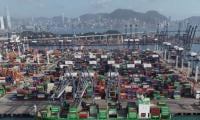To address biodiversity damage, Sherry calls for climate financing developing countries
ISLAMABAD: Federal Minister for Climate Change Senator Sherry Rehman on Thursday said new financial support to developing countries is critical to address loss and damage and achieve biodiversity objectives.
The minister said this while addressing the first plenary of the Stockholm+50 meetings on behalf of the G77 and China, chair to the group of 134 countries attending the event and emphasised the “need for simplified, long-term and long-overdue climate financing for the developing countries to address biodiversity loss and damage caused by fossil fuel emissions and the anthropogenic activities of the developed countries.”
The general debate was attended by more than 10 heads of states and more than 90 ministers from 130 member states participating in the event, as well as representatives from the civil society and private sector.
On the role of developed countries, Federal Minister for Climate Change Senator Sherry Rehman expressed we need ambitious and bold actions today to reduce the impacts of climate change to ensure the protection, conservation and sustainable use of our environment and natural resources.
She said COP26 resulted in positive and ambitious mitigation targets to meet the long-term global goal of maintaining the increase in the global average temperature to well below 2C above pre-industrial levels and to pursue efforts to limit the temperature increase to 1.5C above pre-industrial levels.
“Developed countries have been historically responsible for majority of global emissions and should make an absolute and significant reduction in their emissions,” she said. In the transition to global net-zero, she said, the developed countries must take the lead and this transition should be based on the principles of equity and common but differentiated responsibilities and respective capacities.
“We welcome the agreement at COP26 in Glasgow to initiate further discussions on enhanced commitments for a new collective, quantified goal on climate finance from the floor of $100bn and prior to 2025,” she said.
Sherry Rehman welcomed the development by the Board of the 10-Year Framework of Programmes on Sustainable Consumption and Production Patterns (10YFP) of a global strategy for sustainable consumption and production beyond 2022 and urged all the stakeholders of the United Nation system to strengthen the implementation of the 10YFP by 2030 through enabling partnerships and commitments for action.
She also welcomed the holding of the first “One Planet Network Forum” to promote global and inclusive dialogue for the implementation of SDG12 and sustainable consumption and production.
Talking about underrepresentation of the Global South in UNEP, she highlighted, “We also need to address the deep and persistent imbalance in the geographic representation within the United Nations Environment Programme (UNEP) and the under-representation of the Global South. Without new, additional, adequate and predictable financial, technological and capacity support from developed countries, the developing countries are unable to achieve these goals and targets of the 2030 Agenda for Sustainable Development and the Paris Agreement.”
In a similar vein, the minister addressed the ministerial-level segment of the meetings of the COP to the Basel, Rotterdam and Stockholm Conventions at Stockholm+50 as a panelist among the ministers.
She stated that globally, the industrial sector alone produces an excess of 7.6 billion tonnes of waste annually; 75 percent of this waste has the potential to be recycled, adding that however only 30 percent is actually recycled.
Conventions like the Basel, Rotterdam and Stockholm are very useful to build national action plans of governments that are distracted by multiple compounded crises such as in Pakistan where its geo-location makes it one of the hottest areas on the earth,” she said.
She said Pakistan, for the last three years, has been home to one of the hottest urban dwellings on this planet. She said these conventions need to ensure stricter checks and balances to prohibit the export of hazardous waste to other countries.
-
 ‘Miracle On Ice’ Redux? US Men Chase First Olympic Hockey Gold In 46 Years Against Canada
‘Miracle On Ice’ Redux? US Men Chase First Olympic Hockey Gold In 46 Years Against Canada -
 Friedrich Merz Heads To China For High Stakes Talks In An Effort To Reset Strained Trade Relations
Friedrich Merz Heads To China For High Stakes Talks In An Effort To Reset Strained Trade Relations -
 Astronauts Face Life Threatening Risk On Boeing Starliner, NASA Says
Astronauts Face Life Threatening Risk On Boeing Starliner, NASA Says -
 Hailey Bieber Reveals How Having Ovarian Cysts Is 'never Fun'
Hailey Bieber Reveals How Having Ovarian Cysts Is 'never Fun' -
 Kayla Nicole Looks Back On Travis Kelce Split, Calls It ‘right Person, Wrong Time’
Kayla Nicole Looks Back On Travis Kelce Split, Calls It ‘right Person, Wrong Time’ -
 Prince William And Kate Middleton Extend Support Message After Curling Team Reaches Olympic Gold Final
Prince William And Kate Middleton Extend Support Message After Curling Team Reaches Olympic Gold Final -
 Nvidia CEO Praises Elon Musk, Calls Him An ‘extraordinary Engineer'
Nvidia CEO Praises Elon Musk, Calls Him An ‘extraordinary Engineer' -
 Shia LaBeouf's Mugshot Released After Mardi Gras Arrest On Battery Allegations In New Orleans
Shia LaBeouf's Mugshot Released After Mardi Gras Arrest On Battery Allegations In New Orleans -
 Timothee Chalamet Felt '17 Again' After Reunion With 'Interstellar' Director Christopher Nolan
Timothee Chalamet Felt '17 Again' After Reunion With 'Interstellar' Director Christopher Nolan -
 Conan O'Brien Speaks First Time After Rob Reiner's Killing
Conan O'Brien Speaks First Time After Rob Reiner's Killing -
 Giant Tortoise Reintroduced To Island After Almost 200 Years
Giant Tortoise Reintroduced To Island After Almost 200 Years -
 Eric Dane Drops Raw Confession For Rebecca Gayheart In Final Interview
Eric Dane Drops Raw Confession For Rebecca Gayheart In Final Interview -
 Trump Announces New 10% Global Tariff After Supreme Court Setback
Trump Announces New 10% Global Tariff After Supreme Court Setback -
 Influencer Dies Days After Plastic Surgery: Are Cosmetic Procedures Really Safe?
Influencer Dies Days After Plastic Surgery: Are Cosmetic Procedures Really Safe? -
 Eric Dane Confesses Heartbreaking Regret About Daughters' Weddings Before Death
Eric Dane Confesses Heartbreaking Regret About Daughters' Weddings Before Death -
 Nicole 'Snooki' Polizzi Reveals Stage 1 Cervical Cancer Diagnosis
Nicole 'Snooki' Polizzi Reveals Stage 1 Cervical Cancer Diagnosis



